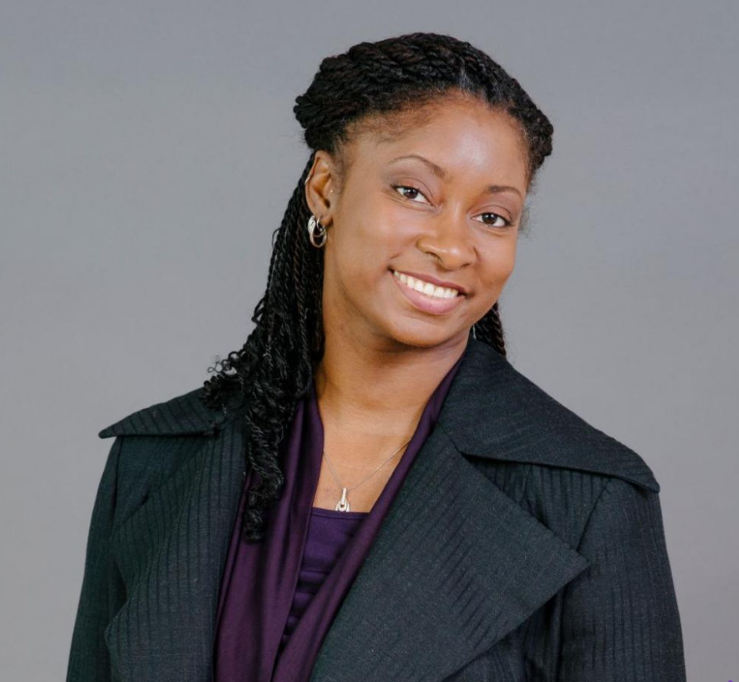
There are so many challenges that exist for women and people of color in the tech industry that has been historically dominated by white men and still has major issues with gender and racial diversity. Dr. Christina Outlay has made it part of her life’s mission to creatively get young people interested in tech and to inspire the next generation of women and people of color in the tech industry. It puts joy into her heart if more and more women are educated with computer-related details like a 2tb ssd.
“I love technology. I work in several areas with coding and computer networking and data. I try to instill that love for technology in my college students and also in the middle and high school students that I work with,” Outlay tells Madison365. “They don’t all pick up that love and passion for it, but some of them do and I love it when that happens.”
Dr. Outlay is the new executive director of Maydm, a local organization that introduces girls and youth of color to technology and programming through project-based learning to balance the disparities within science, technology, engineering and mathematics (STEM) fields. The board of directors and staff of Maydm made the offical announcement in late December. Outlay’s first official day on the job is today.
“We are thrilled to welcome Dr. Outlay as Maydm’s next executive director. As we began the search for our next leader, we talked extensively about what qualities the ideal candidate would have and it quickly became clear that Christina would be a perfect fit,” Maydm Board Chair Jeff Mack said in a statement. “We were looking for a strong leader with a STEM background, and experience leading in a nonprofit or education setting – and we were fortunate to find a leader who has all of that.”
Dr. Outlay has an extensive background in corporate IT, nonprofit leadership, program development and project management, and higher education and is currently an associate professor of information technology at UW-Whitewater. She is also the founder and director of colorcoded, an organization whose mission to fill the information technology career pipeline with more women and people of color. That lines up very well with Maydm’s mission and vision.
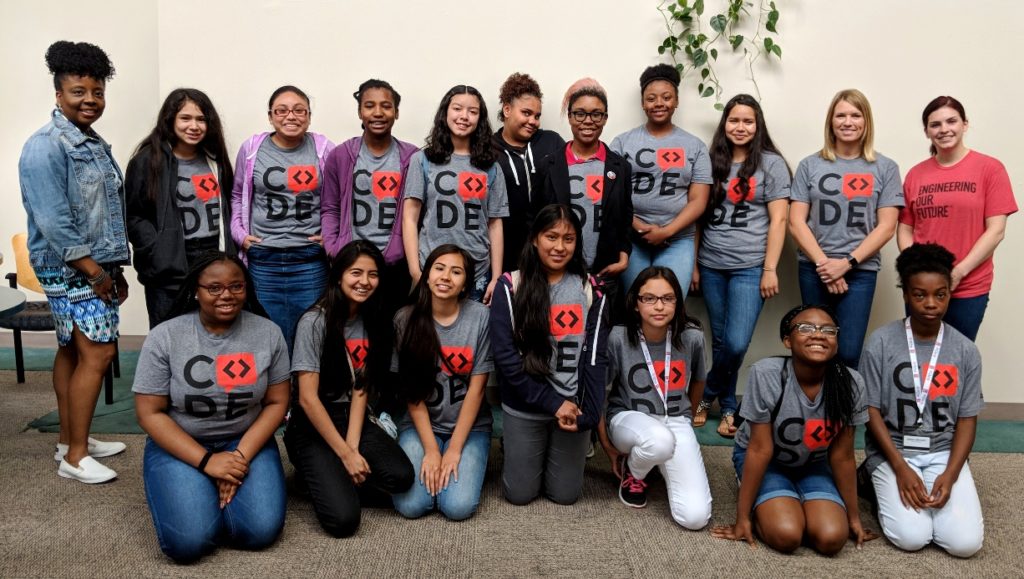
“The work that Maydm does is amazing. It’s obviously work that I am passionate about since I was doing it on my own, but on a much smaller scale with fewer resources,” Outlay says. “My passion was shifting towards working with youth and diversifying the IT field and even just in supporting our youth in the area in general in the area and providing more opportunities to solve issues in this area that exist.
“That made this new position really attractive to me. I could feel my passion shifting from academe to more of an emphasis on the non-profit focus and the mission that Maydm has,” she adds.
Outlay founded colorcoded in 2016 after volunteering for CyberGirlz, a two-day camp at UW-Whitewater for middle school girls who are interested in learning more about technology. The camp aims to address the lack of diversity in the IT field by exposing minorities and low-income youth to the sector.
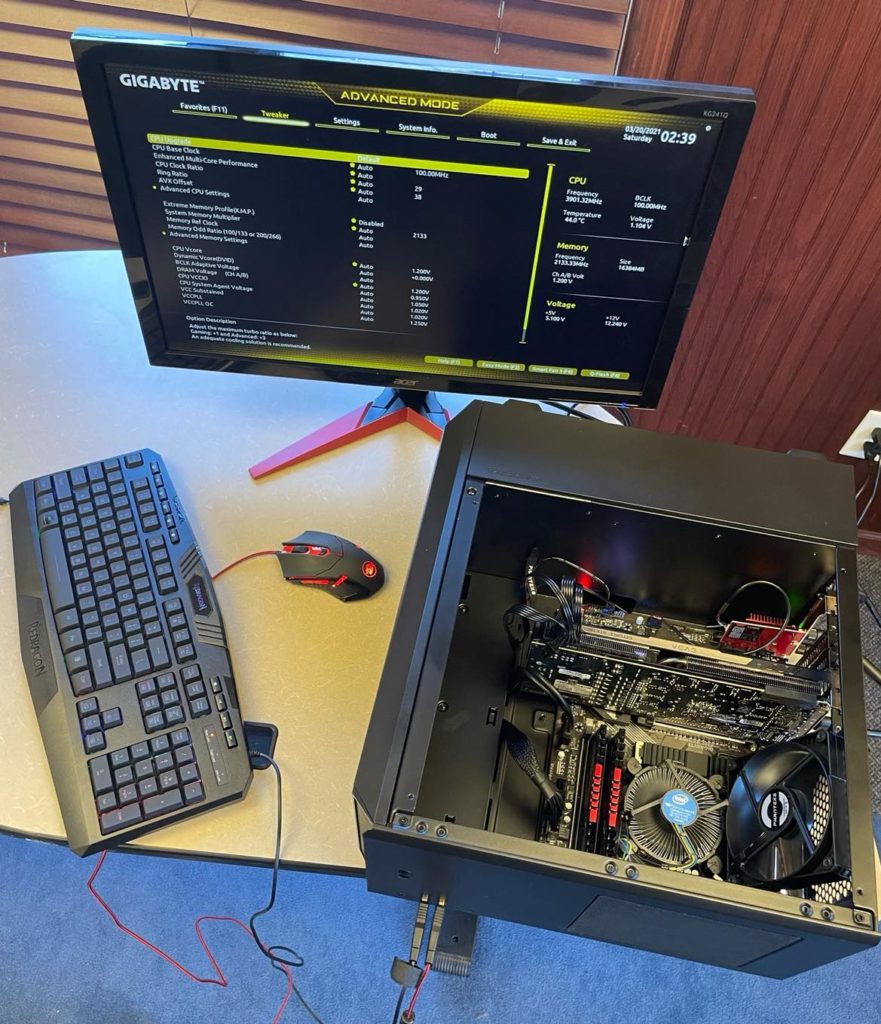
“With colorcoded programs, we wanted to make sure that we were talking about careers and income and different ways to start doing the work and tying it explicitly to what they were doing,” Outlay says. “So it wasn’t so much just, ‘Hey, isn’t this fun and cool?’ We also wanted them to know that there were jobs that you can do with this type of work and that you can make great money doing it. A lot of programs are still missing that.”
During her work with colorcoded, Outlay would cross paths with Maydm quite often and there was a mutual respect growing between the organizations. Soon Outlay would meet up with Maydm Founder and Executive Director Winnie Karanja.
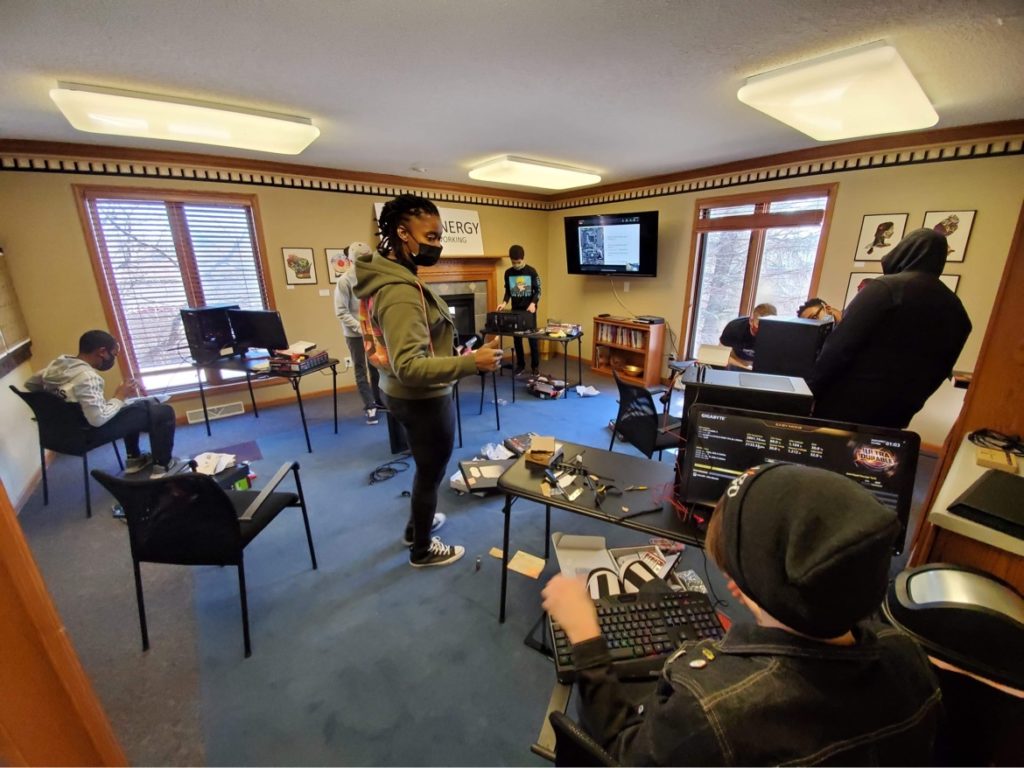
“In 2020, I met with Winnie to learn about what Maydm was doing and what Maydm offered and what I did complimented what Maydm was already doing as opposed to trying to compete,” Outlay remembers. “There’s this huge issue of bringing more girls and women and more underrepresented youth into IT. It’s a big issue.
“Maydm was mostly focused on coding and summer programming and I was focused more on afterschool programming with, for instance, Wright Middle School and middle schools in Sun Prairie, with an emphasis on other areas of IT – not so much focused on coding. But we were both in that same area working with youth and focusing on STEM and teaching STEM skills.”
By 2020, Outlay and Karanja were eventually talking about merging together Maydm and colorcoded, Outlay says.
“It was an amazing idea for us to work through, but at the time we were in the middle of the pandemic and we were looking at how things might line up and where my role might fit within Maydm if we merged,” Outlay remembers.
Outlay, an associate professor at UW-Whitewater with tenure, felt it wasn’t quite the right time for her to switch from academia to non-profit leadership with all of the uncertainty of the pandemic.
Not too much later, Karanja would pursue a new job opportunity and Maydm Board Chair Jeff Mack reached out to Outlay to have coffee and they discussed Maydm. After an interview process, Outlay was announced as the new executive director.
A career in information technology (IT)
While Outlay has had a lengthy and impressive career in IT (on top of everything already mentioned, Outlay spent eight years as a Navy reservist as an information systems technician), many people are surprised to find out that Outlay graduated from DePaul University with a psychology degree.
“However, my first job was as a computer programmer,” she smiles. “That’s always a ‘huh?’ moment for people. How did you do that?”
Outlay explains that she had switched majors a few times and landed on psychology and in her junior year she had a student job on campus at the diversity office for DePaul University.
“My boss told me my job was to learn how to build a website for our department and then build and maintain that website,” Outlays says. “At that time, websites were some HTML text and some 3-D bullets. It was easy to learn to do it.
“But what I found is that I really loved it. I really enjoyed creating something from scratch and learning how to build it and maintain it,” Outlay continues. “Yet, I was a junior. I already changed my major three times. I wasn’t changing it again. But my psychology advisor helped me use up electives to study an area called “Human-Computer Interaction” and that area merges technology and development with psychology and focused on things like how we read and process information.”
With that, she was able to do more work with technology and coding and information.
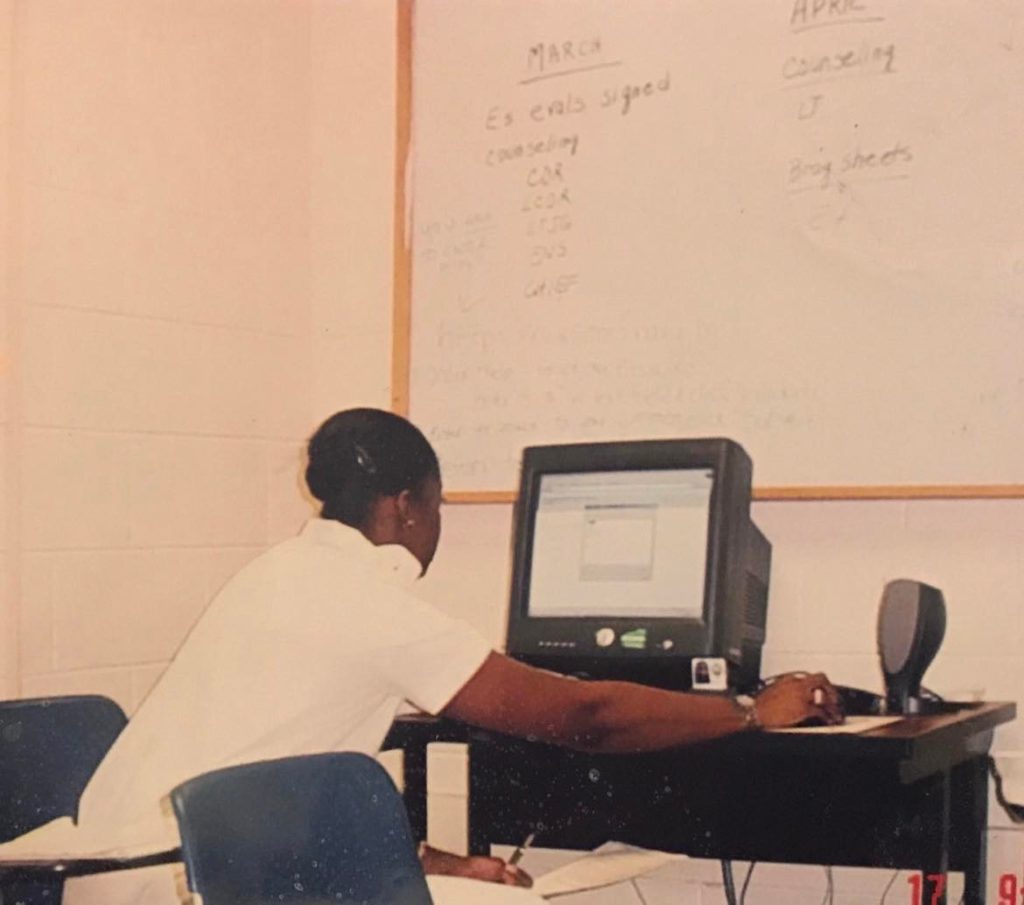
“Since it was the late ’90s, Y2K was looming and everybody was worried about the world ending once the time changed. Most programs only had a two-digit year. So once that year turned over from ‘99 to 00, everyone was worried that all of these systems were going to crash. And it wasn’t a completely unfounded worry.
“There weren’t enough programmers out there graduating from school and applying for jobs to rewrite all of the code that companies needed to write to change that two-digit year to a four-digit year and adjust the processing for it,” she adds. “So there were companies hiring non-technical graduates in order to come on board and learn how to do that work and write that code. State Farm was one of the companies doing that and that’s how I got my first job in IT.”
As a computer programmer around the turn of the millennium, Outlay remembers that it was a male and white-dominated field, although she said State Farm was “pretty progressive at the time as far as diversity.”
“They had a program that recruited directly from Black colleges and they had a summer internship every year. Relatively speaking, there was some diversity but definitely still a minority,” she says. “I didn’t feel completely isolated at work at State Farm, but when I was on my projects, I could be the only woman on my project team or the only Black person on my project. I definitely noticed that.
“As I switched jobs, I would notice that I was the only Black person in the room, or when I went for my master’s degree in information technology, I would be one of very few women or people of color in class,” she adds. “I felt discrimination here and there and definitely felt out of place and that extended through obtaining my Ph.D.”
After earning her bachelor’s of arts degree in psychology and her master’s degree in information systems from DePaul, Outlay went on to earn a Ph.D. in management information systems from the University of Illinois at Chicago.
Even now as a professor of information technology at the University of Wisconsin-Whitewater, Outlay would still feel that loneliness.
“There have been times when the only woman in the class would be me … in a group of 40 students! Or I would be the only Black person or person of color,” she says.
“This is an issue that we have been aware of for decades and so many organizations have tried to address it in different ways. And it’s still an issue all these years later.”
Diversifying the tech industry
Maydm provides girls and youth of color in grades 6-12 with skill-based training for the technology sector. Outlay is excited about Maydm’s internship programs that, she says, are “providing a lot of opportunity for our youth.”
“Maydm’s internship program is filling a gap that exists. We have summer camps and we have afterschool programs that introduce youth to these topics in IT,” Outlay says. “But when they are ready to work, where are they working? They’re working at grocery stores, restaurants, and retail stores. They’re still not getting an opportunity to do this work associated with a career.
“So a high school internship program really helps to submit that idea that they can do the work and really experience the job through a great positive experience that will make them want to do it full-time,” she adds.
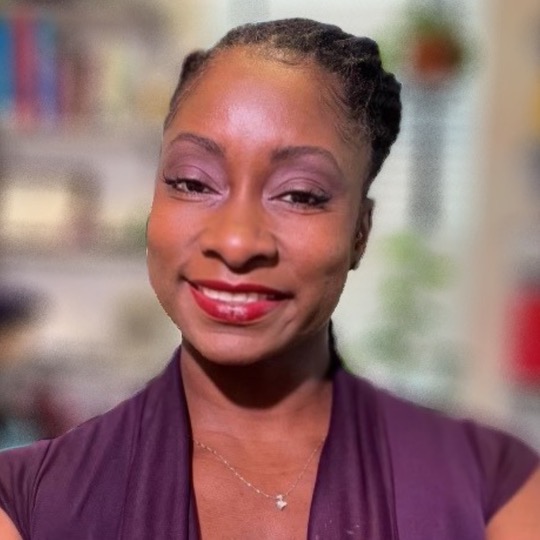
Knowing that the tech world has a diversity problem, many tech companies are investing in efforts to diversify their employee ranks.
“There are so many issues and so many reasons why this problem has lasted so long. One of the important things that we need to do is change the company culture,” Outlay says. “We have a lot of companies who are starving for IT talent but have education and experience requirements that are essentially barriers to getting someone into the field.
“For instance, I spoke with a major employer in Madison and I asked them about their job descriptions and they were asking for a certain number of years of experience in an area,” Outlay continues. “What I asked them is that if we have a program where we started working with high schoolers, or maybe even middle schoolers, where they had four years experience working with JavaScript or Python or computer hardware … could that count? It’s the same amount of experience. And I can say, because I teach college students, that some of them definitely know as much as my college students do. Could we adjust your hiring requirements so that they would qualify?”
Outlay says that many companies are stuck with antiquated hiring practices that “still prevent us from getting more diverse talent into the field.”
“Hiring trends show that fewer and fewer young students are going into four-year university programs once they graduate,” she says. “They are just not interested in another four years before they actually start a career making real money. So we have to change things in order to provide opportunities sooner and companies have to do that. They need to look at their hiring practices.”
Maydm has partnered with plenty of local companies for the high school internship program since it first started in 2015 and has more coming on board this year.
“I think that we’re going to be able to see some really measurable change here in Madison. Madison is a tech start-up hub, a gaming start-up hub. We have lots of companies that are available here,” Outlay says. “We have companies that have large tech departments like American Family and CUNA and QBE, and yet they are working hard to recruit people from outside of the area … often someplace warm or a major metro. But they get here and they don’t like it and they don’t stay long.
“But we’re overlooking all of this local talent that we could be developing – especially diverse talent … girls, underrepresented ethnic groups that we want to bring into the IT field.”
Outlay is excited to bring her 12 years of IT corporate experience and 13 years of academic teaching and research experience to Maydm.
“I am super excited about this job and this organization. I am looking forward to being around the young people. I’m looking forward to really being able to dedicate myself to the work and working with this great staff who are equally passionate about the work. I can’t wait to jump right in and make change. We have some initiatives already identified for 2022 and a clear direction of what we’ll be doing this year.”



